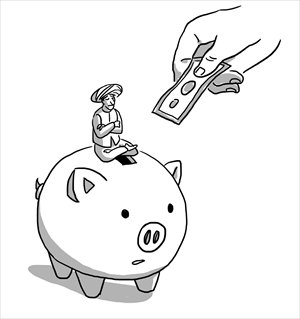By Subramanian Swamy


Illustration: Liu Rui
India suffered from British imperialism for two centuries. Unlike in
China, where colonial influence was exerted indirectly, the British
ruled the country through an established government that exploited
peasants and workers through the machinery of rule, sucked agriculture
dry of resources through an imposed feudal system, and exported India's
resources to Britain to finance its industrial development. The British imposition of a Western education and government system blocked locals from benefiting from the industrial revolution sweeping Europe.
It is against this background that Indians view foreign investment. Indians are naturally suspicious of the motives of foreign investors and want to proceed cautiously.
The fundamental principle we wish to follow is to accept what is necessary according to what we need and cannot easily produce ourselves. Thus India does not want to globalize blindly.
Unlike most other countries including China, India's households provide more than 85 percent of domestic savings, which make up an overwhelming proportion of investment today. Their contribution may be as high as 35 percent of GDP.
Foreign investment can add to this pool of investment funds, but it comes at a cost. If the foreign investment comes as portfolio investment, with the mobility to enter and exit at short notice, it causes financial instability.
If we allow financial services to be penetrated by foreign firms, then they will recklessly use computer generated derivatives to convert mortgage into liquid funds as we saw recently in the US.
There the financial services wizards shifted and spread risk through derivatives to overload the financial system. As a consequence, a small perturbation in the economic situation caused a huge recession in the US economy and resulted in a worldwide slump.
Foreign portfolio investment with unbridled derivatives can wreck any economy. India therefore has to exercise great caution that, in our open economic system, the winds of financial globalization do not destabilize our future prospects.
At present, there is great agonizing going on in India about foreign direct investment in retail trade and insurance and pension funds. As far as retail trade is concerned, Indian traditional traders work on very small margins, because the cost of capital measured by the prime lending rate of banks over 12 to 18 percent annually, a painfully high rate.
In contrast, for companies like the US giant Walmart, the lending rate is 2 to 4 percent. Hence, the Indian traders, who number in their millions, are agitated, because there cannot be fair competition on a level playing field with Walmart and other US competitors that benefit from favorable policies.
In addition, wage rates will rise if Walmart and similar firms recruit Indian labor, making it even more difficult for Indian traders to face competition.
And why do we need Walmart? What new technologies or techniques will it bring that Indians do not know already?
In China, Walmart's entry is understandable since the decades of the planned economy set back trade as an activity.
Hence when China, under former leader Deng Xiaoping's guidance, undertook economic reforms in the 1980s, China had to fill the trading class void by importing the marketing services of foreign companies.
However in India, we have no shortage of traders and hence this argument does not apply.
If the US was ready to allow Indian companies to take Indian labor to the US to build roads, constructing houses, running textile companies, and setting up software companies, then I would not object to Walmart coming to India.
But we cannot accept the US double standard of bringing in cheap capital to India and use its cheap labor but not allowing Indian companies to bring cheap labor to the US and borrow cheap capital from US banks.
The author is president of India's Janata Party. He received his PhD in economics at Harvard University and is a former Indian Cabinet minister for commerce and law. opinion@globaltimes.com.cn
Source: http://www.globaltimes.cn/content/741779.shtml#.UJMYd6xKyIs.twitter
No comments:
Post a Comment